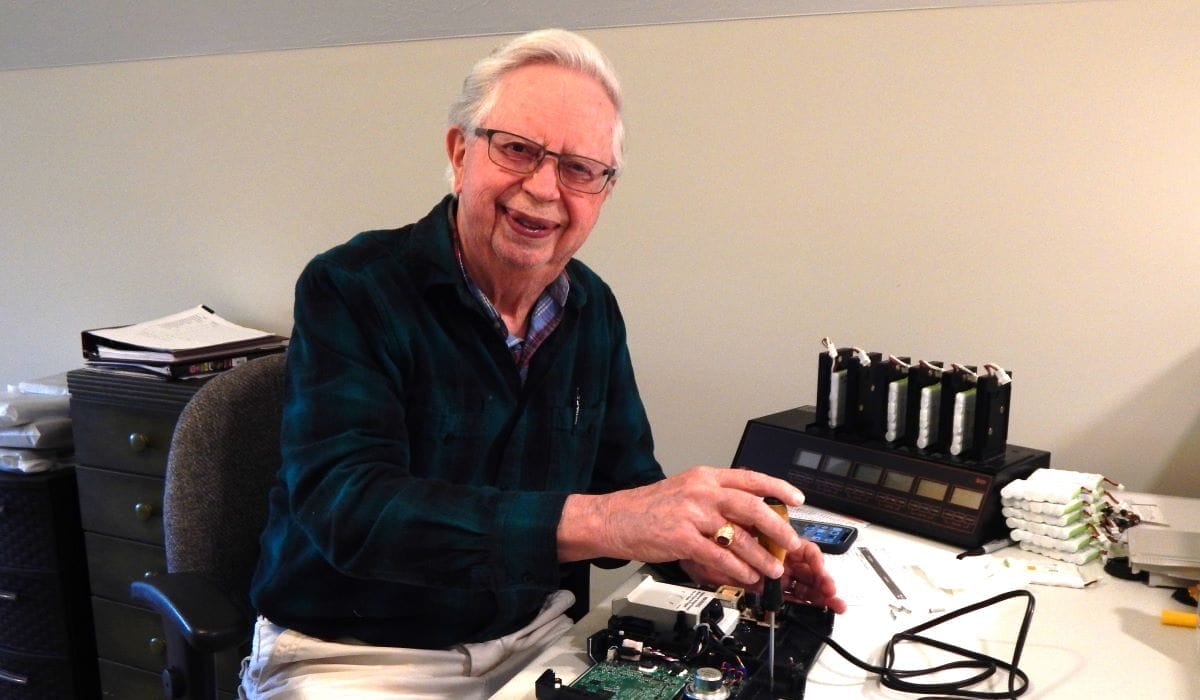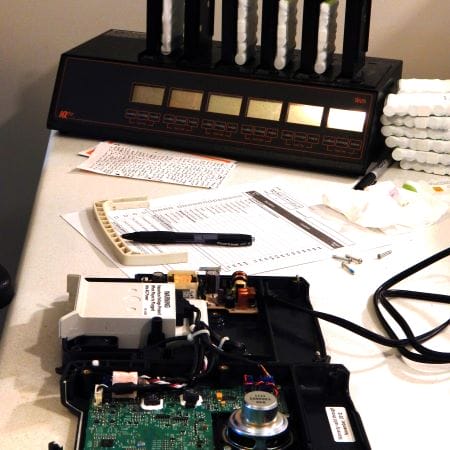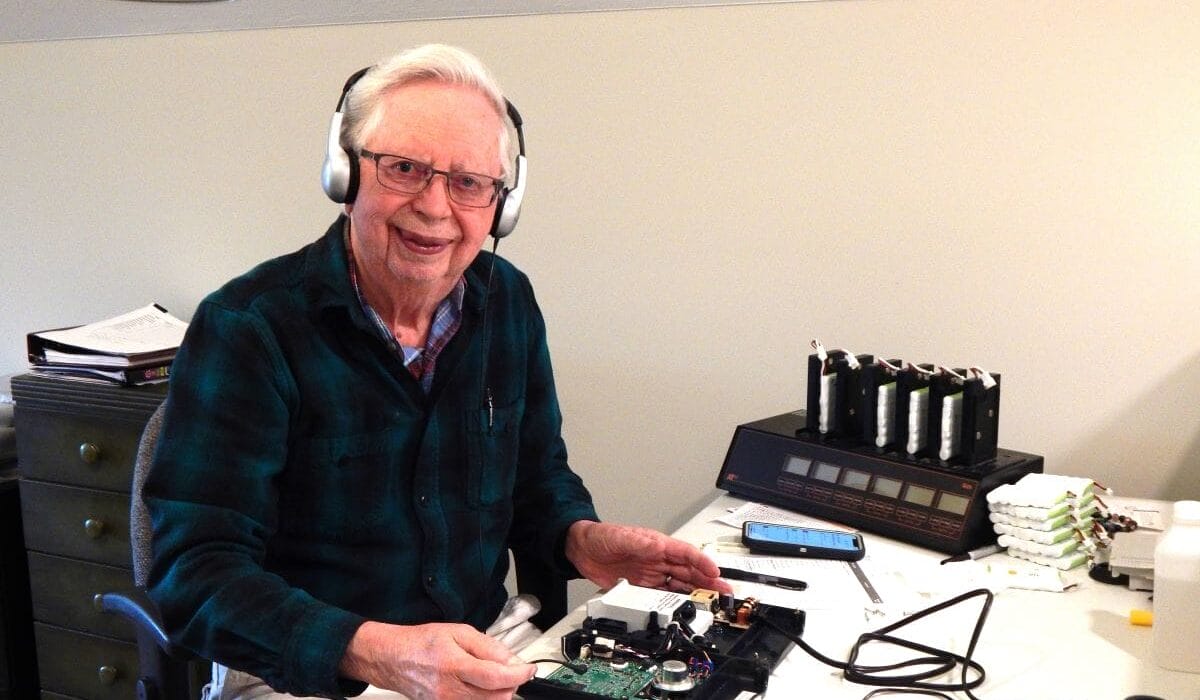Volunteer Dedicates Decades to Ensuring Vision- and Physically-Impaired Can Read

Meet Daily Point of Light Award honoree Gerry Garvelink. Read his story, and nominate an outstanding volunteer or family as a Daily Point of Light.
The Talking Book and Braille Center celebrated 50 years of bringing free audio and Braille materials to the Kent District Library last year. Patrons who struggle or are incapable of reading traditional books because of a visual or physical impairment can participate in a cherished pastime and learning experience thanks to funding from the Library of Congress’ Library Service. Their support extends to a network of libraries across the country.
“The program has been in existence since the ‘30s. It was originally designed for veterans who were coming back from the war with loss of eyesight, and it’s just expanded,” cites Susan Greene, an equipment technician who runs the Lansing hub department that sends out equipment to patrons across Michigan. “It’s such a wonderful program where it can take a person who would otherwise feel isolated and allow them to function in book clubs or Bible studies or with their grandchildren who are reading books in school. They can read the same books. They can have meaningful discussions with their family and they can use these books to keep abreast of the things that are going on in the world.”
People who have permanent limitations or temporary issues (like those recovering from an eye surgery or a hand injury that makes it hard to hold a book) can sign up for the service. The center also lends to schools, nursing homes and rehab centers.
Equipment allows a patron to listen to a book or magazine and navigate the hierarchy of an article, easily referencing different parts of, for example, a religious text while adding bookmarks or notations. Machines with refreshable Braille displays are also available. Ninety-year-old Gerry Garvelink, a man who repairs, maintains and mechanically restructures the center’s devices, has been a dedicated volunteer for 21 of those 50 years.
Gerry grew up on a small dairy farm with dreams of being a farmer himself. With eighth grade coming to a close, he

thought his school days were over, but the state then officially required kids to continue to the age of 16. By then, his feelings about learning had changed.
“As years went by, I started to like it more and more. So, I did end up going to college,” he says, recalling his journey to completing his Master’s degree in engineering with encouragement from teachers along the way.
He married and moved back to Grand Rapids for a career in computer programming at Lear, the company that became Smith’s Industries by the time he retired in 1997. Through a Boeing contract, he even did some work on their 737’s navigation system. By 2003, he had done some volunteer work with his church, but when he saw in the center’s ad in the newspaper calling for helpers to recondition talking book players, he knew it would be a good fit.
“I always liked to take things apart and try to fix them, so that sounded good to me,” he points out, reminiscing about putting an alarm clock and the family car back together at various points in childhood only to find both still malfunctioning.
For the first several years, Gerry and fellow volunteers would meet every Monday and spend the day working on cassette-compatible machines.
“They were very challenging. There was always something considerably wrong with them. I enjoyed that,” he laughs.
But when the tech advanced, so did Gerry’s skills. After 12 years of Mondays, thanks to Susan and her colleague Bob, a blind staff member knowledgeable about the devices, Gerry learned the ins and outs of maintaining today’s digital machines.
“Every time [machines] come back, they are cleaned and put through a series of tests. And then, anything that is wrong with them is fixed, and they are given a brand-new charged battery,” Susan explains. “All the old information is completely wiped clean, so [patrons are] essentially getting a brand-new machine.”
A few years later, COVID hit. While the local branch shut down, Lansing’s was deemed essential though staff was reduced from 20 to five. Gerry continued with his routine of being helpful and convinced them to box up devices for him to pick up at his local branch to recondition at home, a change that has remained in place. Sixteen devices and necessary supplies arrive for him each week and take him 10 to 12 hours to look over.
“It works out very well,” he admits of managing his own time. “And it feels good, too, because I think I’m doing blind people and disabled individuals some service.”

While Gerry and Susan have only met in-person during that training almost a decade ago, they touch base at least once a week and, during the pandemic, kept a humorous text chain going with Bob to help each other stay positive. Susan is always there for questions or when Gerry needs a part.
“What Gerry does is just miraculous for us. It’s allowed us to provide service in such a timely fashion to our patrons,” Susan affirms. “There’s just no way that we could keep up with the repairing and all the things that he has done over the years when he’s volunteered his time.”
Since mid-2020, Gerry has maintained over 4,000 devices with his 526th box shipping out just days ago. With over two decades of experience, he has really gotten to know the people he volunteers with and appreciates the stability of repetition. Though he’s never personally met anyone who benefits from the center, he’s happy knowing he is making life a little easier for people facing those challenges.
“This activity has been really good for me in a lot of ways–emotionally, physically, mentally. I think it’s just so good for a person to be doing something worthwhile for others. I think that’s so important for a very contented lifestyle,” he says. “It just seems to me that that it’s the right thing to do.”
Do you want to make a difference in your community like Gerry? Find local volunteer opportunities.